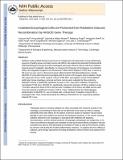| dc.contributor.author | Niu, Yunyun | |
| dc.contributor.author | Wang, Hong | |
| dc.contributor.author | Wiktor-Brown, Dominika | |
| dc.contributor.author | Rugo, Rebecca | |
| dc.contributor.author | Shen, Hongmei | |
| dc.contributor.author | Huq, Saiful | |
| dc.contributor.author | Engelward, Bevin P. | |
| dc.contributor.author | Epperley, Michael | |
| dc.contributor.author | Greenberger, Joel S. | |
| dc.date.accessioned | 2011-11-28T20:47:42Z | |
| dc.date.available | 2011-11-28T20:47:42Z | |
| dc.date.issued | 2010-04 | |
| dc.date.submitted | 2009-02 | |
| dc.identifier.issn | 1938-5404 | |
| dc.identifier.issn | 0033-7587 | |
| dc.identifier.uri | http://hdl.handle.net/1721.1/67297 | |
| dc.description.abstract | Radiation-induced DNA damage is a precursor to mutagenesis and cytotoxicity. During radiotherapy, exposure of healthy tissues can lead to severe side effects. We explored the potential of mitochondrial SOD (MnSOD) gene therapy to protect esophageal, pancreatic and bone marrow cells from radiation-induced genomic instability. Specifically, we measured the frequency of homologous recombination (HR) at an integrated transgene in the Fluorescent Yellow Direct Repeat (FYDR) mice, in which an HR event can give rise to a fluorescent signal. Mitochondrial SOD plasmid/liposome complex (MnSOD-PL) was administered to esophageal cells 24 h prior to 29 Gy upper-body irradiation. Single cell suspensions from FYDR, positive control FYDR-REC, and negative control C57BL/6NHsd (wild-type) mouse esophagus, pancreas and bone marrow were evaluated by flow cytometry. Radiation induced a statistically significant increase in HR 7 days after irradiation compared to unirradiated FYDR mice. MnSOD-PL significantly reduced the induction of HR by radiation at day 7 and also reduced the level of HR in the pancreas. Irradiation of the femur and tibial marrow with 8 Gy also induced a significant increase in HR at 7 days. Radioprotection by intraesophageal administration of MnSOD-PL was correlated with a reduced level of radiation-induced HR in esophageal cells. These results demonstrate the efficacy of MnSOD-PL for suppressing radiation-induced HR in vivo. | en_US |
| dc.description.sponsorship | National Institutes of Health (U.S.) (NIH Grant R01-CA83876-8) | en_US |
| dc.description.sponsorship | National Institute of Allergy and Infectious Diseases (U.S.) (NIH grant U19A1068021) | en_US |
| dc.description.sponsorship | National Institutes of Health (U.S.) (Grant T32-ES07020) | en_US |
| dc.description.sponsorship | United States. Dept. of Energy (DOE DE-FG01-04ER04) | en_US |
| dc.description.sponsorship | National Institutes of Health (U.S.) (NIH P01-CA26735) | en_US |
| dc.language.iso | en_US | |
| dc.publisher | Radiation Research Society | en_US |
| dc.relation.isversionof | http://dx.doi.org/10.1667/rr1763.1 | en_US |
| dc.rights | Creative Commons Attribution-Noncommercial-Share Alike 3.0 | en_US |
| dc.rights.uri | http://creativecommons.org/licenses/by-nc-sa/3.0/ | en_US |
| dc.source | PubMed Central | en_US |
| dc.title | Irradiated Esophageal Cells are Protected from Radiation-Induced Recombination by MnSOD Gene Therapy | en_US |
| dc.type | Article | en_US |
| dc.identifier.citation | Niu, Yunyun et al. “Irradiated Esophageal Cells are Protected from Radiation-Induced Recombination by MnSOD Gene Therapy.” Radiation Research 173 (2010): 453-461. | en_US |
| dc.contributor.department | Massachusetts Institute of Technology. Department of Biological Engineering | en_US |
| dc.contributor.approver | Engelward, Bevin P. | |
| dc.contributor.mitauthor | Engelward, Bevin P. | |
| dc.contributor.mitauthor | Wiktor-Brown, Dominika | |
| dc.contributor.mitauthor | Rugo, Rebecca | |
| dc.relation.journal | Radiation Research | en_US |
| dc.eprint.version | Author's final manuscript | en_US |
| dc.type.uri | http://purl.org/eprint/type/JournalArticle | en_US |
| eprint.status | http://purl.org/eprint/status/PeerReviewed | en_US |
| dspace.orderedauthors | Niu, Yunyun; Wang, Hong; Wiktor-Brown, Dominika; Rugo, Rebecca; Shen, Hongmei; Huq, M. Saiful; Engelward, Bevin; Epperly, Michael; Greenberger, Joel S. | en |
| mit.license | OPEN_ACCESS_POLICY | en_US |
| mit.metadata.status | Complete | |
